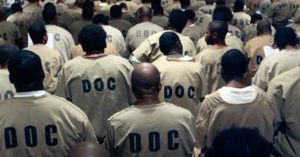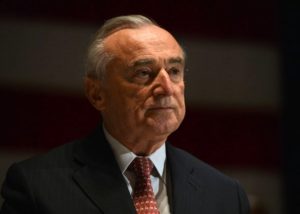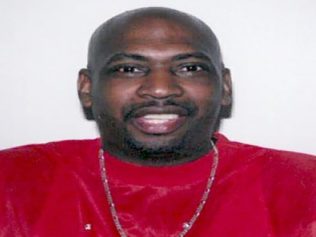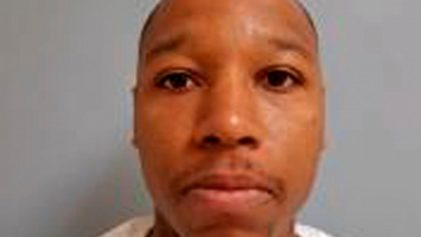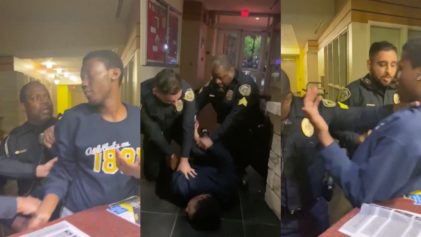It was a week in which the impact of the #BlackLivesMatter movement to end police violence and reform the criminal justice system was more than evident. An organization of law enforcement officials, an unlikely group of people, gathered to call for an end to mass incarceration. This comes as President Obama praised #BlackLivesMatter and defended it from its detractors, and New York protesters gathered to remember loved ones killed by police brutality.
At a press conference at the National Press Club in Washington, a group of 130 police chiefs, sheriffs, prosecutors, and attorney generals from all 50 states called for an end to “unnecessary incarceration” in America. These law enforcement officials convened as police brutality, use of deadly force and aggressive over-policing tactics in some of their jurisdictions–particularly “broken windows” and stop-and-frisk policies in Black and Latino communities–have come under intense scrutiny and have contributed to the very mass incarceration they seek to eradicate.
The new group is called Law Enforcement Leaders to Reduce Crime and Incarceration, a project of the Brennan Center at NYU Law School, which is described as “an unprecedented partnership” among the top law enforcement leaders in the nation to promote reforms to reduce incarceration and increase public safety. The group has garnered support from entities as diverse as the NAACP and the Koch Brothers.

The group also noted that incarceration in America has reached crisis levels, with the country having 5 percent of the world’s population but 25 percent of its prisoners. There are 2.2 million people behind bars and 5 million on probation and parole.
“If the prison population were a state, it would be the 36th largest — bigger than Delaware, Vermont, and Wyoming combined,” the statement of principles reads. “Too many people are behind bars that don’t belong there. Extensive reliance on prison as a punishment does not keep us safe. Imprisoning people at today’s exorbitant levels has little crime control benefit.”
The statement also notes a recent study which found that increased incarceration has a limited, shrinking effect on drops in crime, with incarceration even increasing crime and acting as a “crime school,” particularly for nonviolent offenders, who are surrounded by violent offenders, and who maintain a social stigma after their release.
Among the reforms sought by Law Enforcement Leaders are reclassifying crimes, noting that shoplifting or writing bad checks are considered felony crimes along with murder in many states. In addition, the group wants to change mandatory minimum sentences for drug and non-violent crimes, noting that some states have experienced a decrease in crime after reducing sentences. Further, the group calls for more mental health and drug treatment, as half of the prisoners in the U.S. have been diagnosed with a mental illness, and more live with substance abuse and addiction.
At the press conference, police chiefs from many of the largest cities in the U.S. spoke, including Charlie Beck of the Los Angeles Police Department, Cathy Lanier, of the Washington D.C. Metropolitan Police Department and Garry McCarthy, superintendent, Chicago Police Department. Representatives from Houston, North Carolina and New Orleans were in attendance as well.
“We must seize this moment to reduce incarceration in the United States while keeping crime down at the same time,” said Ronal Serpas of the New Orleans Police Department. “We share a common problem. The way our country is currently approaching criminal justice does not ensure public safety. In fact, it makes our jobs much more difficult. Arresting and imprisoning low level offenders prevents us from dedicating that time to serious offenders and repeat violent offenders.”
“Police departments cannot be at war with communities they serve,” said Charlie Beck of the LAPD, noting he has been through the “war on drugs” and “war on gangs,” and a shift in the ways police do their job is necessary. “It’s time that we think of this as a peace dividend. We’ve come to recognize that the issues that we deal with cannot be solved by merely locking people up and throwing away the key. We have to look at things such as treatment, we have to look at issues such as placement, we have to look at what to do with people when they leave jail. Pathways to success instead of pathways to prison.”
Beck noted that in California, simple narcotics possession has been reduced to a misdemeanor, resulting in drug arrests plunging to a mere 10 percent of all arrests, a huge shift in the state’s criminal justice system.
“What we have to do — and this may be a little bit radical — is really start thinking about what constitutes a crime,” McCarthy said. “If you put a gun in somebody’s face and say, ‘Give me your money,’ that’s a crime. And if you get caught with 10 bags of heroin, do you think that those two crimes should carry the same weight in the criminal justice system? It just doesn’t make sense.”
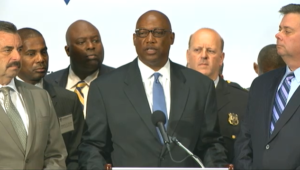
Charles McClelland, Chief of the Houston Police Department, speaking with Law Enforcement Leaders at National Press Club on October 21, 2015.
“The war on drugs has been a tremendous failure. It really has had a disparate impact on Black and Brown communities,” said Charles McClelland, Chief of the Houston Police Department.
McClelland emphasized the need for law enforcement to use their limited resources wisely and efficiently.
“In Houston, in Harris County, Texas for almost a year we have been diverting low level offenders–first time offenders that have small amounts of marijuana–into programs where they’re held accountable, they must admit their mistakes, but they can walk away without a criminal record.” The police chief also mentioned alternatives to incarceration for people with mental illness and addiction, “to make sure we’re locking up the right people for the right reasons.”
“We as police leaders, chiefs and sheriffs must be facilitators and organizers to make sure we spark a broader conversation across this nation that goes directly to the heart of poor parenting, failing schools, poverty and unemployment,” McClelland noted. “We’ve got to rethink the equation where we make young people, especially young men of color in their mid twenties unemployable because they have a high level misdemeanor or felony on their record for drugs, a nonviolent crime, and no vocation, education or job skills.”
Meanwhile, in recent years, cities throughout the country have faced blowback over official policies of harassment and violence against Black and Latino citizens, and have suffered amid poor relations between law enforcement and communities of color. For example, Chicago is embroiled in a scandal over the detention of thousands of mostly Black men without access to an attorney or public contact in Homan Square, a secret, CIA-style black site warehouse. Protesters have called for the closing of the facility, in which Black men have been interrogated and detained for hours and even days, and released after promising not to speak to a lawyer about what they endured.
Further, William Bratton of the NYPD has promoted “stop- and-frisk,” and was even an architect of the policy, placing him at odds with Mayor Bill de Blasio. Stop-and-frisk has resulted in the unwarranted harassment of thousands of Black and Latino men in that city, presumably in the hopes of recovering drugs, weapons and contraband from innocent, unarmed citizens who are free of suspicion but for their skin color.
Earlier this year, Bratton called for the state legislature to raise the penalty for resisting arrest from a misdemeanor to a felony, as the #BlackLivesMatter movement and social protest against police brutality began to grow. As NPR reported, a Black person arrested for disorderly conduct is 65 percent more likely to be charged with resisting arrest than a white person, and 85 percent more likely in arrests involving drug possession.
Meanwhile, Salon reports that Bratton has learned from his mistakes, and has become one of the most prominent faces of police reform. In his new book about Bratton, Blue: The LAPD and the Battle to Redeem American Policing, journalist Joe Domanick argues that the NYPD chief is “the most significant reformer of the past 25 years.”
Attacking stop-and-frisk as racist, Dunne noted that in his previous job as head of the LAPD, Bratton addressed racism in the department, encouraged innovation and introduced community policing and working with grassroots leaders.
In contrast to the first wave of police reform leading to broken windows and stop-and-frisk, Dunne told Salon: “Now, there’s a second, desperately-needed wave of [police] reform — and it’s not coming from inside the police department. It’s coming from African-American leaders, the Black Lives Matter [movement], and from a generation of millennials who are much more tolerant. That has to include a total commitment to community policing and really understanding that repression through stop-and-frisk has to stop.”
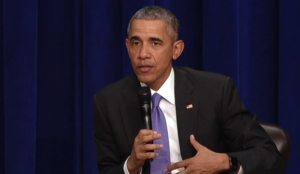
President Obama meets with law enforcement leaders for White House discussion on criminal justice reform, October 22, 2015. Yahoo News/Marshall Project.
On Thursday, President Obama received the Law Enforcement Leaders group at the White House for a panel discussion on criminal justice. He used the occasion to defend and praise the #BlackLivesMatter movement, arguing the issues the activists have raised must be addressed in efforts for reform. He seemed to dismiss those who embrace the counter-slogan “All Lives Matter.”
“I think everybody understands all lives matter,” Obama said. “I think the reason that the organizers use the phrase ‘Black Lives Matter’ was not because they were suggesting nobody else’s lives mattered. Rather, what they were suggesting was there is a specific problem that is happening in the African-American community that’s not happening in other communities. And that is a legitimate issue that we’ve got to address.”
“The African-American community is not just making this up,” the President added, urging critics to take allegations of police abuse seriously, while also urging those who claim Black people disproportionately experience excessive police force to “back it up with data, not anecdote.”
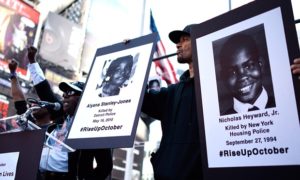
Nicholas Hayward Sr, the father of Nicholas Hayward Jr who was killed by police in 1994, holds a picture of his son in Times Square on Thursday. Photograph: Justin Lane/EPA
Meanwhile, on Thursday in New York’s Times Square, activists and the family members of those who lost loved ones to police violence said the names of the victims who have died, as part of a three-day effort against police brutality, as the Guardian reported.
“We need to put an end to police brutality and police murder,” said Nicholas Heyward Sr., whose son, Nicholas Heyward Jr., 13, was killed by police in 1994 while playing with a toy gun in a Brooklyn housing project.
The case bears similarities to the more recent Tamir Rice case in Cleveland.
Heyward told the crowd, “We are talking about innocent lives that are being taken constantly and they never, never are being held accountable for the crimes they are committing,”
